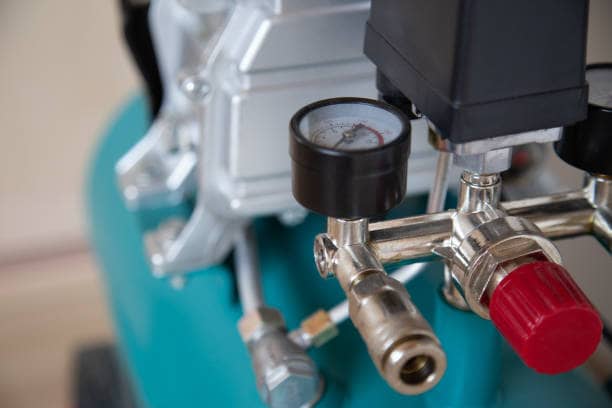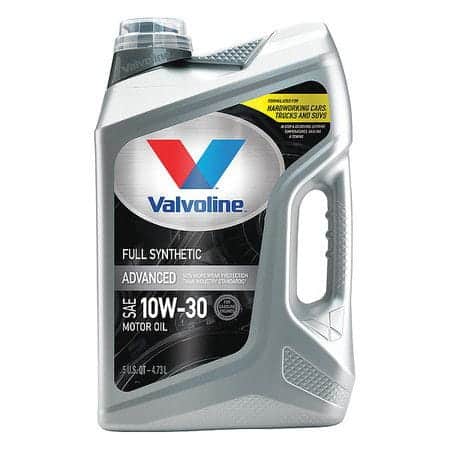Air compressors are increasingly becoming common household chines. Like most machines, you will need to change their oil periodically to function correctly and last a long time.
In the automotive world, 10w30 is considered one of the “high-performance” oils. You might wonder, “Can I use 10w30 in my air compressor?”
This article will help you answer that question. So keep reading to get the correct answer.
Can I Use 10W30 In My Air Compressor?
Manufacturers recommend using an air compressor oil without detergents. So you should not use 10W30 for compressors as it contains detergents.
Oil-lubricated compressors require special compressor oil that allows your machine to reach its capacity peak and last a long time.
One thing that sets these oils apart is that they don’t contain detergents.
Detergents, which are commonly found in other oils, can clean the internal components of combustion engines.
In a compressor, detergents might prevent grit from dropping to the oil sump’s bottom. Instead, it will be kept suspended in the oil.
It will cause buildup on the cylinder walls or piston that might damage the machine’s motor.
What are the Characteristics of The Compressor Oil?
How Cold Or Hot the Oils Can Get
The heat created by compressors requires to be controlled by used oils. The engine temperature can reach around 120°F and can cause damage changes in oils.
Consistency of oils
The oil thickness should rely on the specific conditions in which your machine’s motor is being run. Warmer conditions are ideal with oil viscosity.
So it’ll be more beneficial to have synthetic compressor oils with exceptional viscosity.
Those characteristics enable compressors to operate hotter and longer without the oil mixture becoming unstable.
Corrosion additives
Any oils come with a mix of oil and additives that make up a total blend.
Compressor oils don’t contain detergents like motor oils. The only additives in compressor oils are corrosion prevention and anti-rust to extend the pump’s lifespan and essential parts.
What If there is a Lack of lubrication or Use of the Wrong Oil
In addition to lubricating the moving components, the compressor oils cool the components so the motor will not overheat.
So it’s not wrong to say that they serve as one sealing agent during compression.
If you don’t perform an oil change on time, it will overheat. In most modern compressors, it will cause one automatic shutdown.
In this case, you must wait for your machine to cool down and replace the available oil before continuing to use your compressor.
Also, failing to change oil can lead to air leakage, meaning your machine will not perform at its best performance. Moreover, a lack of oil can lead to even more wear and tear.
What Type of Oil Will Work Best for Compressors?
We recommend checking out your owner’s manual, which typically tells you what type of oil will work best for your machine.
Compressor oil is always the best choice as they do not include detergents that you can find in many motor oils.
Whether you buy synthetic or standard, ensure you gain the proper kind for your specific machine.
If you cannot find the owner’s manual, search for your model online.
If you still cannot find anything specific, remember that most compressors work great with standard 68-grade or 100-grade hydraulic compressor oils.
When Should You Add Oil to Your Air Compressor?
The answer depends on the kind of compressor. Some will require more oil changes than others. How often you utilize your machine is also essential.
One of the best ways to decide how often to change the oil of your machine is to read the owner’s manual. It will tell you to do an oil change based on months or service time.
Generally, rotary screw compressors typically require an oil change every 1,000 or 2,000 hours of use, while their reciprocating counterpart usually needs an oil change every two months.
If you detect any performance problems with your machine, you should check out the oil first, as it can affect the efficiency and pressure.
Sometimes, you just top off or change your current oil to fix problems.
What are Substitutes for Compressor Oils?
There are three common substitutes to air compressor oils:
- Hydraulic Oil
- Non-detergent motor oil
- Automatic Transmission Fluid (or ATF)
Hydraulic Oil
Many users consider hydraulic oils the perfect choice to replace compressors.
They generally have a low viscosity at lower temperatures, allowing them to flow freely given their low density.
Pros
- Most types protect against corrosion and rust.
- Available in various automotive stores and hardware.
- Provide lubrication and cool for internal parts.
Cons
- May void the warranty if used.
- Fairly more expensive than other options.
- Less is available than other options.
- It does not work well for larger machines (20-gallon or more).
Non-detergent Motor Oil
It is okay to use synthetic motor oils as an excellent substitute for compressor oils if you have no other option.
Pros
- Fairly inexpensive.
- Prevent overheating.
- It can be found in various automotive stores and hardware.
- Provide lubrication for internal pump components.
- Many manufacturers accept it as one acceptable temporary alternative.
Cons
- Less common.
- May void warranty if utilized.
Automatic Transmission Fluid (ATF)
The Automatic Transmission Fluid (ATF) is typically used in automotive applications. You can use it as a standard compressor oil substitute.
Pros
- Protect against corrosion effectively.
- Prevent overheating.
- Naturally more convenient than other alternatives.
- Easy to buy, available at many auto parts stores.
Cons
- May void warranty if used.
- Low viscosity can cause internal leaks.
- It might include detergents that negatively affect compressors.
FAQs
Is 10w30 a Mineral Or Synthetic Oil?
It is synthetic and composed of man-made base oils instead of natural ones.
That way, it has certain benefits over mineral products, such as longer service life and improved resistance to water contamination.
Where To Buy 10w30 Oil?
10w30 is available at many automotive stores. But it’s essential to consult the owner’s manual to get the most exact suggestion for your requirements.
When Should I Use an Air Compressor Oil Substitute?
You should only use substitutes when you cannot find air compressor oils.
There’s no guarantee that the alternatives will work well with your machine. We recommend avoiding substitutes whenever you can.
How Can I Identify Non-detergent Oils?
If the label says API CL, it is a detergent oil. If it says API SA, it is a non-detergent one.
The Bottom Line
Most motor oils made for car engines, such as the 10W30, do not work well for compressors as they contain detergents.
These detergents create condensation in the compressor’s motor and might emulsify, leading to damage or clogging the engine.
You can use 10W30 in your machine as a last resort, but only for a short time and only if you can flush your tank afterward.
Thanks for reading!


